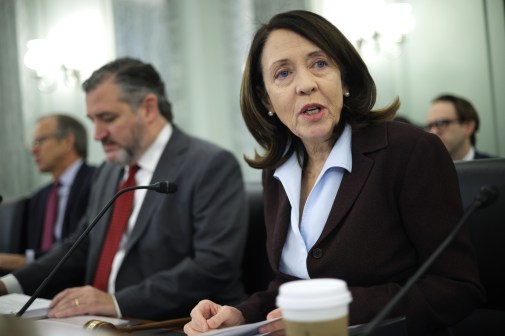Ex-White House official says Congress, federal agencies should do more for AI talent search

A former White House official told a Senate panel Wednesday that lawmakers should ask the Office of Management and Budget for more authority to ease the hiring of skilled artificial intelligence workers.
During a Senate Homeland Security and Governmental Affairs hearing, Jennifer Pahlka, former U.S. deputy chief technology officer within the Office of Science and Technology Policy, said that federal agencies require support to add and encourage AI tech talent, which involves reducing burdens on agencies for hiring processes. Pahlka said that while OPM’s memo that authorizes direct hire authority removes some red tape for agencies, it does not help agencies that have to run separate hiring processes for open positions.
In an interview with FedScoop after the hearing, Pahlka said that the government needs to “pair mandates with enablement,” and that it is critical to both hire AI talent and upskill existing federal employees.
“In government, we invest orders of magnitude less than we should and upskilling our people. We should be training folks, not on compliance issues, like how to comply” with the White House’s AI executive order, Pahlka said. “We should be having a huge investment in fundamentals of core digital work as a foundation, including training on AI. We could do a lot more than we’re doing now and we still wouldn’t be doing enough.”
As for next steps, Pahlka said that some existing tools can help these AI recruitment efforts, like Subject Matter Expert Qualifying Assessments, or SME-QAs, which already support a streamlined approach to hiring. If paired with pool hiring, Pahlka said the government could bring on “great people, quickly.”
“We have to recognize that just changing a policy is insufficient; the engagement and education has to go along with it and sometimes it’s very hard to do,” Pahlka told FedScoop. “OPM doesn’t really have the resources. The philanthropy world needs to step up and see this as a critical issue and say, ‘how can we help with all of that stuff that’s hard for a constrained agency to do so that we can get the people we need in government?’”
Pahlka said that she “would love to see a super honest, frank conversation between folks on the Hill and folks in an agency,” where they discuss what barriers to hiring could be removed.
Noting that she was not able to discuss it during the hearing, Pahlka said that the government’s approach to funding needs to change from a “once and done” procurement philosophy to longer-term maintenance of projects and funding programs.
She stated that the timeline for funding projects often runs for a year or two, then faces large layoffs before the project becomes neglected during operation and maintenance time. Then, the government calls for modernization efforts for said project.
“AI is going to make that even more critical. We can just buy something and then be done with it,” Pahlka said. “We need a competency, ongoing, to work with the AI. It’s consistent with what I’m saying overall, which is the thing that we needed to do in the Internet era, that is work that is still undone now, really needs to be done because of AI.”




